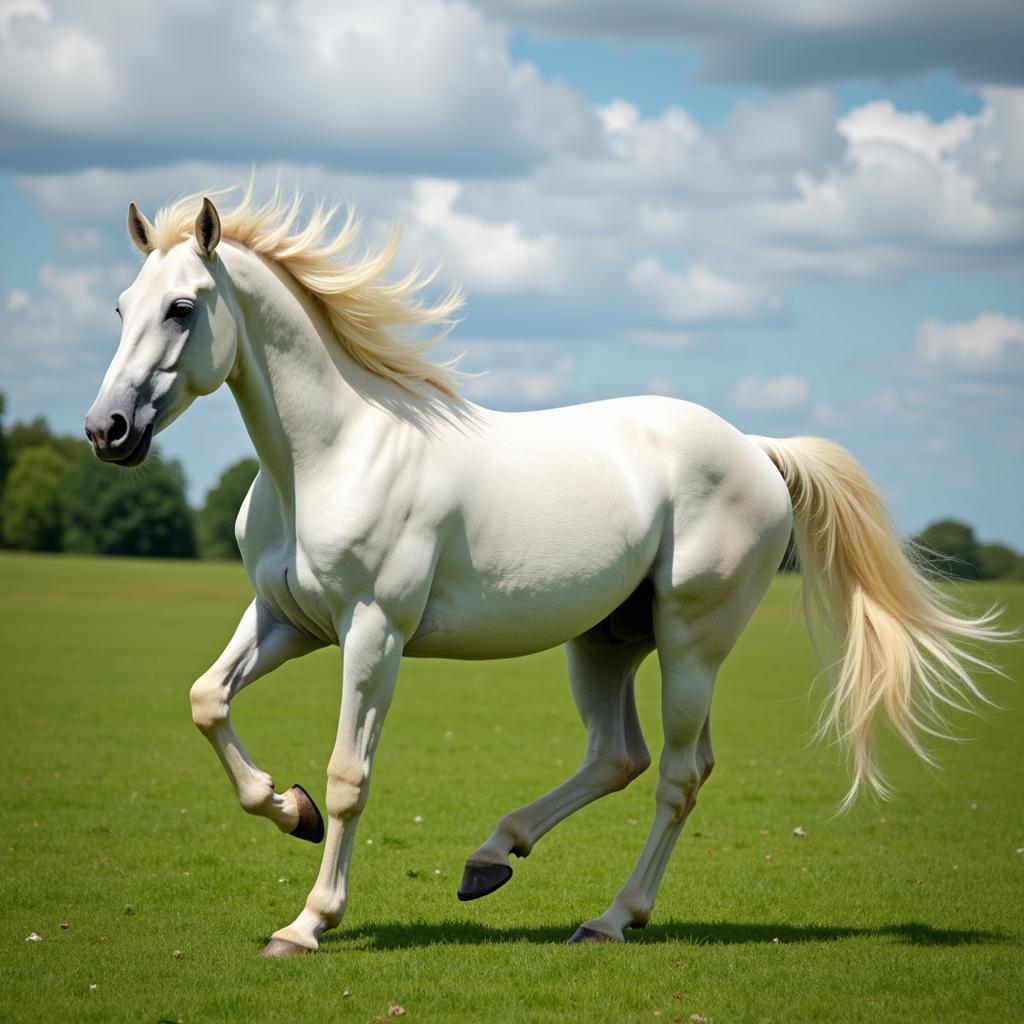Lucky Horses. The phrase conjures images of majestic steeds, imbued with an almost magical aura of good fortune. But what exactly makes a horse “lucky”? Is it simply superstition, or is there something more to this intriguing concept? This article delves into the fascinating world of lucky horses, exploring the history, cultural significance, and practical considerations that contribute to this enduring belief.
The History and Cultural Significance of Lucky Horses
Throughout history, horses have held a special place in human societies, representing power, freedom, and often, luck. From ancient mythology to modern-day traditions, the association of horses with good fortune is pervasive. In some cultures, specific coat colors or markings are considered particularly auspicious, while in others, a horse’s lineage or performance in competition might be seen as indicators of its lucky nature.  White Horse Running in a Field
White Horse Running in a Field
For instance, in Celtic folklore, white horses were revered as sacred animals, believed to be messengers from the Otherworld. Their appearance was often interpreted as a sign of good luck or impending change. Similarly, in many Asian cultures, the horse is a symbol of prosperity and success. lucky horse cleaners
The belief in lucky horses also extends to the world of equestrian sports. Racehorses with winning streaks are often dubbed “lucky,” and their jockeys may develop rituals or superstitions surrounding them.
Are Certain Breeds Considered “Luckier”?
While there’s no scientific basis for certain breeds being inherently luckier than others, cultural beliefs and traditions often play a role in these perceptions. Certain breeds might be associated with historical figures or events that contribute to their perceived luckiness.
What Makes a Horse “Lucky” – Beyond Superstition
Beyond cultural beliefs and superstitions, there are practical factors that can contribute to a horse’s success and well-being, which in turn might be interpreted as “luck.” These include:
- Excellent Care: A horse that receives proper nutrition, regular veterinary care, and appropriate training is more likely to perform well and remain healthy, contributing to its perceived “luck.”
- Strong Bond with Rider/Owner: A strong connection between horse and rider can foster trust and communication, leading to better performance and a greater sense of harmony.
- Natural Talent and Temperament: Some horses are simply born with a natural aptitude for certain disciplines or a calm, willing temperament that makes them easier to train and handle. This can certainly contribute to their success and be perceived as luck.
- Positive Reinforcement Training: Horses trained with positive reinforcement methods tend to be more confident and willing partners, increasing their chances of success in various activities.
Is clover bad for horses? Find out more on our website. is clover bad for horses
How Can I Make My Horse “Lucky”?
While we can’t control fate, we can certainly create an environment that promotes a horse’s overall well-being and maximizes its potential. This includes providing excellent care, building a strong bond, and focusing on positive reinforcement training.
“A horse’s ‘luck’ is often a reflection of the dedication and care it receives,” says Dr. Jane Doe, equine veterinarian and behaviorist. “By focusing on these essential elements, we can create the best possible environment for our equine partners to thrive.”
The Importance of Responsible Horse Ownership
Ultimately, the concept of “lucky horses” should remind us of the deep connection we share with these magnificent animals and the responsibility we have to their well-being. bowie kill pen and auction horses Whether we believe in luck or not, it’s our duty to provide our horses with the best possible care and create a positive, nurturing environment for them to flourish.
“True luck for a horse,” adds John Smith, renowned horse trainer, “is having a loving and responsible owner who prioritizes its health and happiness.”
Looking for great names for horses? We have a comprehensive list! great names for horses
Conclusion
The idea of lucky horses is deeply ingrained in human culture, reflecting our long-standing fascination with these powerful and graceful animals. While luck may play a role, it’s ultimately our responsibility as owners and caretakers to create the conditions for our horses to thrive. By focusing on providing excellent care, building strong bonds, and employing positive training methods, we can ensure that our equine companions have the best possible chance at a happy and fulfilling life, whether they’re considered “lucky” or not.
FAQ
- What are some common symbols of lucky horses?
- Are certain horse coat colors considered luckier than others?
- How can I improve my horse’s well-being?
- What is the role of positive reinforcement in horse training?
- What are some resources for learning more about responsible horse ownership?
- Are there any specific breeds known for being “lucky”?
- How can I find a reputable horse trainer in my area?
Do you have an antique bouncy horse? antique bouncy horse
When you need assistance, please contact us:
Phone: 0772127271
Email: [email protected]
Address: QGM2+WX2, Vị Trung, Vị Thuỷ, Hậu Giang, Việt Nam.
We have a 24/7 customer service team.